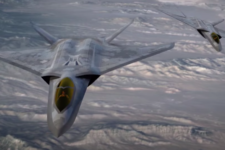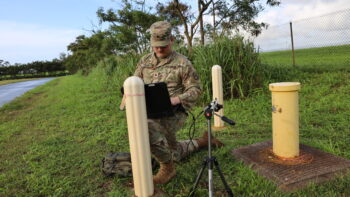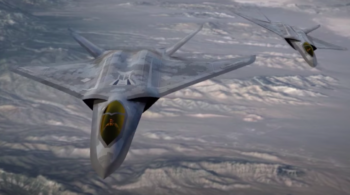
The RTX chalet at the 2023 Paris Air Show shows off both the rebranded company name and its older Raytheon Technologies title. (Aaron Mehta/Breaking Defense)
WASHINGTON — Defense firm RTX has decided to sell off its cybersecurity and intelligence unit for more than a billion dollars to a mystery buyer, the latest reorganization for the company formerly known as Raytheon.
Along with its third quarter 2023 earnings, on Tuesday RTX said it “has entered into a definitive agreement to sell its Cybersecurity, Intelligence and Services business within its Raytheon segment,” adding that the sale price is “approximately $1.3 billion” and subject to regulatory approvals.
In a call with investors, RTX CEO Greg Hayes said the cybersecurity unit’s sale, along with that of Collins’s actuation business, would net RTX about $3 billion “in gross proceeds in 2024.”
Neither RTX’s initial announcement nor Hayes said who the buyer for the cybersecurity unit was. In a statement, an RTX spokesperson also declined to identify the buyer beyond saying they are a private equity firm. On Tuesday Reuters, citing sources, reported private equity firm Blackstone was the buyer. Blackstone did not immediately respond to Breaking Defense’s request for comment today.
“We regularly review our portfolio to ensure our business is best positioned to deliver for our customers, stakeholders and employees. Based on that review, we decided to divest our Cybersecurity, Intelligence and Services business,” the spokesperson said. “A private equity firm has signed an agreement to acquire the business, which we believe gives the business greater autonomy to deliver on customer missions and allows it to serve as a platform for innovation well into the future.”
RTX took on that name in June during a reorganization that made Raytheon a defense-only subsidiary alongside alongside Collins and Pratt & Whitney. During the reorg, RTX said it had created eight “strategic business units,” with Cybersecurity, Intelligence and Services for offensive and defensive cyber capabilities among them.
Killer Apps: 5 stories highlight quiet progress on military AI and CJADC2
While combat has seen a drone revolution, the US has made subtle but real advances in applying AI to military planning, intelligence, and “all domain” command and control.

























